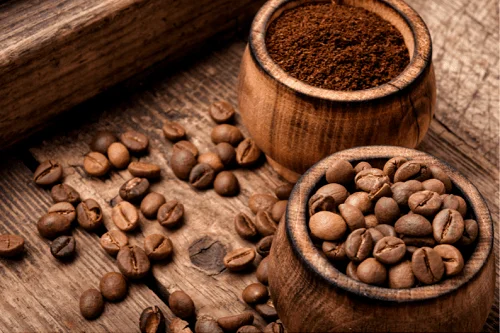Coffee
Why Are Coffee Beans Expensive Than Ground Coffee?
Coffee enthusiasts often notice a significant price gap between whole coffee beans and ground coffee. This discrepancy prompts an intriguing question: why are coffee beans expensive than ground coffee? Delving into the intricacies of coffee production and processing reveals a nuanced understanding of this phenomenon.
Coffee Beans vs. Ground Coffee
The Nature of Coffee Beans
Coffee beans are the seeds found within the coffee fruit. Encased within a protective parchment layer, these beans boast distinct flavor profiles. Upon harvesting, they undergo drying and roasting to enhance their flavors.
The Process of Ground Coffee
In contrast, ground coffee is pre-roasted, ground, and packaged for immediate use. Different grind sizes cater to various brewing methods, with coarser grinds suited for French press and finer grinds ideal for drip coffee.
Grind Sizes Matter
The choice of grind size significantly impacts the coffee’s taste, aroma, and overall brewing experience. Each grind size complements specific brewing techniques, influencing the resulting cup of coffee.
Purity and Processing
The core distinction between coffee beans and ground coffee lies in their purity. While coffee beans are natural and minimally processed, ground coffee often contains additives like sugar or flavoring, compromising its purity.
Acidity Levels: A Flavor Distinction
Coffee beans exhibit higher acidity levels than their ground counterparts, influencing the coffee’s overall flavor.
Furthermore, a notable contrast emerges concerning the acidity level between coffee beans and ground coffee. Generally, coffee beans tend to exhibit greater acidity compared to ground coffee, a factor that can significantly influence the resulting flavor of your brewed coffee.
If your preference leans towards a milder, less acidic coffee experience, you might consider selecting ground coffee instead of coffee beans.
The Value of Coffee Beans and Ground Coffee
Coffee Beans as a Specialty Product
Coffee beans hail from specific regions, often hand-picked, and require meticulous roasting to unveil their flavors. This attention to detail contributes to their elevated cost.
Shelf Life Considerations
Coffee beans boast a longer shelf life compared to ground coffee. While beans can be stored for months, ground coffee’s flavor diminishes within weeks of grinding.
The Freshness Factor
Freshness plays a pivotal role in coffee’s quality. Coffee beans, roasted and packaged, retain their freshness longer, making them the preferred choice for those seeking optimal flavor.
Making the Choice: Coffee Beans or Ground Coffee
Freshness and Flavor as Key Factors
For the finest coffee experience, grinding beans just before brewing ensures unrivaled freshness and flavor. However, ground coffee offers convenience and affordability, catering to various preferences.
Budget and Convenience Concerns
Ground coffee’s cost-effectiveness and simplicity make it an attractive option for those seeking a quick caffeine fix. Balancing budget and taste preferences guides the choice between beans and ground coffee.
The Pros and Cons of Coffee Beans
Pros of Coffee Beans
Coffee bean enthusiasts value their robust flavors, achieved through natural oil retention. Grinding beans offers customization of grind size, enhancing brewing techniques and cup quality.
Cons of Coffee Beans
Grinding coffee beans demands time and care, and they require more storage space. Susceptibility to quicker staleness and potential digestive sensitivity are notable drawbacks.
The Pros and Cons of Ground Coffee
Pros of Ground Coffee
Ground coffee’s convenience and affordability appeal to many. Its uniform grind size and longer shelf life, compared to beans, contribute to its popularity.
Cons of Ground Coffee
Varying qualities and flavor inconsistencies arise due to grind size variations. Lower-quality ground coffee might lead to digestive discomfort, and flavor disparities can emerge even within the same brand.
Final Thoughts: Ground Coffee vs. Beans
In the world of coffee, the price disparity between coffee beans and ground coffee is influenced by a multitude of factors. From cultivation challenges to roasting expertise, packaging, and consumer preferences, each element contributes to the final cost. The choice between ground coffee and beans hinges on individual preferences. While coffee beans offer superior flavor and freshness, ground coffee presents a budget-friendly and accessible option.
Nevertheless, these advantages are accompanied by a drawback – coffee beans are expensive than ground coffee.
Ultimately, the decision rests with you. If your aim is to savor the utmost quality in your coffee, opting for coffee beans is the way to go.
However, if convenience and cost-effectiveness take precedence, selecting ground coffee is the preferable choice. Regardless of your decision, we hope you relish every sip of your coffee!
FAQs
1. Is it worth the extra cost to buy coffee beans?
Investing in coffee beans rewards you with enhanced flavor and freshness, making the expense worthwhile.
2. How long can I store coffee beans?
Coffee beans can be stored for several months, maintaining their flavor. Ground coffee should be used within weeks to retain freshness.
3. Can ground coffee be as flavorful as coffee beans?
While ground coffee is convenient, coffee beans offer superior flavor due to retained oils and freshness.
4. Does the grind size affect the taste of coffee?
Absolutely. Grind size determines flavor extraction and influences the overall taste of your coffee.
5. What is the best way to store coffee beans and ground coffee?
Store coffee beans in an airtight container in a cool, dark place. Ground coffee requires similar storage to maintain its quality.

